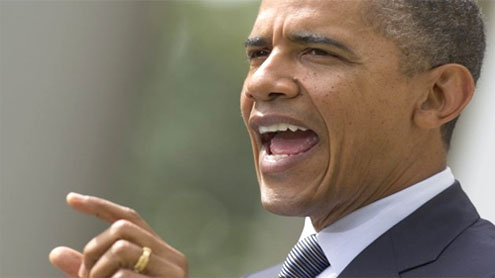 After the flurry of bitter exchanges in recent days between the US and Pakistan, better sense seems to have prevailed, if the diplomatic efforts and change of tone emanating from Washington is anything to go by. US Ambassador Cameron Munter has interacted with Pakistan Foreign Secretary Salman Bashir immediately after his return from Washington.
After the flurry of bitter exchanges in recent days between the US and Pakistan, better sense seems to have prevailed, if the diplomatic efforts and change of tone emanating from Washington is anything to go by. US Ambassador Cameron Munter has interacted with Pakistan Foreign Secretary Salman Bashir immediately after his return from Washington.
They have agreed to remove the ‘misunderstanding’ and continue the negotiations process to avoid the relationship taking a turn for the worse. Reports say Bashir discussed Mullen’s statements, the blame game and ‘baseless allegations’ against Pakistan and suggested avoiding the media for sorting out issues, relying on diplomatic channels instead.
He has also asked once again for intelligence about the Haqqani network, which is a rhetorical question better put to Aabpara. State Department spokesmen in Washington have avoided stoking the fire by fending off probing questions by the American media amidst calls by US politicians to reconsider, at the very least, aid to Pakistan and return the relationship with Pakistan to a ‘transactional’ one. This implies quid pro quo.
Pakistan meanwhile has launched a diplomatic offensive to take its closest allies into confidence. The visit of the Chinese Vice Prime Minister Meng Jianzhu yielded Beijing’s traditional support to Pakistan and agreements to help with infrastructure and other projects to the tune of $ 250 million. The Saudi intelligence officials who reportedly visited Islamabad, followed by ISI chief General Shuja Pasha’s dash to Riyadh, are being viewed by some as Saudi mediation between the two quarrelling ‘allies’. The military too, whether reflected in the Corps Commanders’ conference statement or ISPR head General Athar Abbas’s formulations, indicated a recognition of the need for ‘quiet diplomacy’ to bring down tensions.
On the other hand, the political leaders of Pakistan have already come out swinging against the US. No doubt this will be further accelerated during and after the All Parties Conference Prime Minister Yousaf Raza Gilani has summoned for September 29, where caution may be thrown to the winds and bellicosity be the order of the day. The prime minister’s own statements, and those of Foreign Minister Hina Rabbani Khar in New York indicate that the politicians are on some other wavelength.
Whether this is a strategy agreed with the military to play ‘good cop, bad cop’ is not certain. What is clear though is that international diplomacy and domestic politics seem to be pulling in different directions. That may be because diplomats and the military see the situation more soberly, devoid of the distortions of populist rhetoric, whereas politicians can seldom resist the temptation to play to their domestic audience, if not the gallery.
The cost of the downward spiral in US-Pakistan relations has already sent shock waves through the economy. The stock exchange plunged amidst fears of a breakdown in relations, the rupee floated to around 90 to the dollar, partly because of the ‘dollarisation’ currently underway amidst fears for the future. These negative signals should give pause to all stakeholders to reconsider their fiercest belligerence against the US. We may not like much of what Washington does or even how it does it. But it is not only the US that has constraints so long as it is engaged in Afghanistan. – Dailytimes
We too have considerations to weigh, first and foremost the struggling economy and the future of a rescue sans US aid and goodwill. Emotion may be cathartic, but it is rarely a good substitute for calm, considered policy, especially in the delicate position Pakistan is placed in, and the fact that the country the gung-ho amongst us want to take on is the sole superpower in today’s world. Not only should the current furore be cooled, diplomatic efforts must find ways to continue to enjoy, if not the goodwill and friendship, at least the tolerance of the US. Any other path will damage Pakistan immeasurably.












